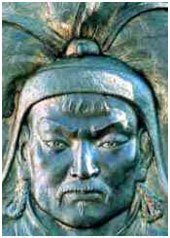Genghis Khan

An influential Mongol warrior had a son and named him Temujin after an enemy leader whose fighting skills he had admired. When Temujin was just 9, his father was killed; and shortly thereafter, Temujin was taken prisoner and placed in a heavy wooden collar. He soon freed himself, and helped his family subsist by snaring marmots and catching fish, hardening himself in the desolate Mongol plains for a life at war.
By his early teens, Temujin had earned a reputation as a fierce warrior, consolidating several tribes under his leadership. While still not 20, he married a child princess from a neighboring tribe for diplomatic reasons, only to have her kidnapped by the Merkit tribe. Temujin raised an army and decimated the Merkits, rescuing his bride and earning the respect of other tribes who felt persuaded to surrender to his leadership.
By the age of 25, Temujin had for the first time ever united all of the Mongol tribes under his rule, earning for himself the title of "Genghis Khan," or "universal lord." His secret was brilliant organization and strategy, rather than brute force. His tribes were required to maintain local defense forces, each of which was initially trained and disciplined by handpicked clan members; before any onslaught, Genghis relied heavily on advance scouts to detect weaknesses; and he used psychological terror, making sure the legends of his ruthless butchering were spread far and wide to persuade certain enemies to fold without a fight.
After consolidating Mongolia, he invaded China in 1206, using catapults and other siege machines to breach the Great Wall within two years of fighting. In 1219, in retaliation for the murders of two of his diplomatic envoys, he turned westward, and captured Turkestan, Iran and Iraq; following that with an invasion of northern India and Pakistan to the South. After invading Russia in 1222, Genghis Khan occupied land from the Persian Gulf all the way to the Arctic Ocean, from Poland to Korea. From conquered cities, Genghis drew even greater strength for his war machine, raising tax money and troops from the vanquished until his riders were "more numerous than ants or locusts" or than "the sand of the desert or the drops of rain" (i.e. at the conquest of Samarkand in Uzbekistan, for example, somewhere around 80,000 heavy cavalry, Genghis' dark horde, with hundreds of thousands of light cavalry archers shooting flaming arrows).
Under Genghis' rule, even though they burned temples and mosques in the service of conquest, the Mongols were surprisingly tolerant of religious differences; in addition to worshippers of Tengri, as Genghis himself was, Genghis' tribes contained Buddhists, Muslims and Christians, and no one was punished for worshipping a different god. He established efficient governments over his conquered peoples and provided them with ample food and security. Although his riders prized the gold, jewels, silk and women they commandeered during their raids, Genghis seems to have cared little for loot, instead viewing conquest itself as "man's greatest good fortune." He died on this day in 1227 around the age of 65.
Only 150 years after his death, of natural causes, was his empire to fall, principally due to in-fighting. Today he is remembered with pride in modern Mongolia as the founding father, Mongolia's George Washington, appearing "cat-eyed" on everything from the Mongolian currency to vodka labels.
Categories: Mongolia





1 Comments:
I always thought Khan was fundamentally a good guy who encouraged a brutal rep for strategic reasons. Glad to hear that you agree.
Tom Thompson
Post a Comment
Subscribe to Post Comments [Atom]
<< Home